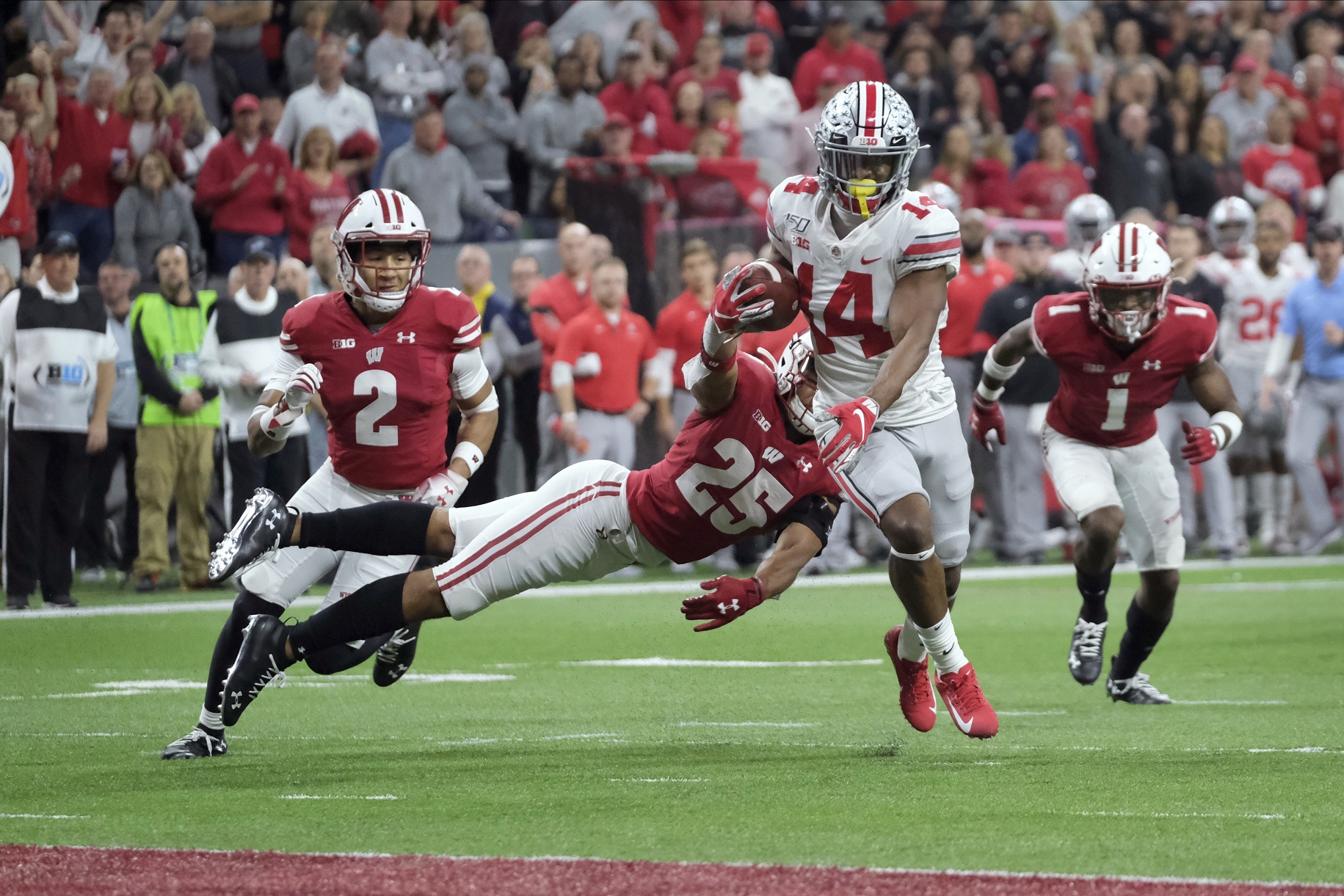
The wait is almost over for the Big Ten.
The ACC, Big 12 and SEC have been playing anywhere from three to five weeks amid the pandemic, and all the players and coaches around the Big Ten could do is watch.
“Most of it’s been torture, just not being able to play games,” Ohio State coach Ryan Day said. “There’s been a part of it I’ve actually enjoyed, but for the most part it’s been hard and I just want to be playing, get these guys on the field and get rolling.”
The eight-game, conference-only schedule begins Oct. 23 with Illinois visiting No. 16 Wisconsin. The rest of the league gets started Oct. 24. Every team plays every week through Dec. 12 barring cancellations because of outbreaks of COVID-19.
No. 6 Ohio State is favored to win a fourth straight league title and return to the College Football Playoff. Buckeyes quarterback Justin Fields, with his wide array of weapons around him, is among the Heisman Trophy front-runners after finishing third in last year’s voting.
Defending West champion Wisconsin and No. 24 Minnesota are expected to battle it out again for the division title.
Just getting to this point has been an adventure. The Big Ten initially put out a 10-game schedule on Aug. 5 only to cancel the season six days later in the name of player safety.
As the ACC, Big 12 and SEC pushed forward with plans to play, the outcry against the Big Ten’s decision was relentless. Nebraska hinted it might schedule games on its own and eight of its players sued the conference. Groups of players’ parents demanded further explanation from Commissioner Kevin Warren and demonstrated near league headquarters. President Donald Trump phoned Warren and encouraged him to play.
The conference reversed course Sept. 16, saying the emergence of rapid virus testing would allow for a season. There are stringent medical protocols, including daily antigen testing, and a positive result would require a player to sit out 21 days.
“It’s been a roller coaster of emotions for sure — we’re playing, not playing,” Nebraska tight end Austin Allen said. “It’s been tough for sure knowing (other conferences) are out there playing, but we’ll get our time. We’ve got games coming up and we’ll take care of business.”
SCHEDULE SCRAMBLE
The Big Ten is on the third iteration of its schedule, following the original released in the spring and the 10-game slate put out in early August. The conference championship game is set for Dec. 19. The rest of the teams also will play a ninth game that day against the team that finishes in the same spot in the opposite division.
Nebraska got the toughest schedule, with three of its first four games against Top 25 opponents (at No. 6 Ohio State, vs. No. 16 Wisconsin, at Northwestern, vs. No. 9 Penn State). Northwestern has the easiest crossover games, with their opener at home against Maryland and a trip to Michigan State on Nov. 28.
2 NEW HEAD COACHES
Mel Tucker takes over at Michigan State for Mark Dantonio, who retired after 13 years, and Greg Schiano returns to Rutgers to replace Chris Ash, who was fired four games into last season.
Tucker was 5-7 in his only year at Colorado before he bolted for Michigan State. He was a graduate assistant there under Nick Saban in the 1990s.
Schiano returned to Rutgers after eight years. He led the Scarlet Knights to a 68-67 record and six bowl games from 2001-11. He was the Tampa Bay Buccaneers head coach in 2012-13 and Ohio State defensive coordinator from 2016-18.
TOP RETURNEES
In addition to Fields, the 2019 offensive player of the year, fellow Associated Press All-Big Ten first-team picks return in Ohio State offensive lineman Wyatt Davis, Iowa kicker Keith Duncan and Illinois punter Blake Hayes. Also back is the 2019 newcomer of the year, Purdue receiver David Bell.
Davis is among players who rejoined their teams after initially deciding to opt out. Some others are Purdue star receiver Rondale Moore, who was limited to four games because of injury; Minnesota 1,200-yard receiver Rashod Bateman; Ohio State cornerback Shaun Wade; Michigan offensive lineman Jaylen Mayfield; and Michigan State defensive lineman Jacub Panasiuk.
INJURY REPORT
Jack Coan, who led Wisconsin to the Rose Bowl last season, is out indefinitely after having surgery on his right foot Oct. 6. The senior quarterback was hurt in a non-contact drill.
Indiana will be without defensive back Marcellino Bell (knee) and safety Raheem Layne (undisclosed). Minnesota linebacker Braelen Oliver (undisclosed) is out indefinitely.
Nebraska cornerback Braxton Clark (shoulder) likely is out for the season, and heralded junior college transfer wide receiver Omar Manning has missed practice time because of injury and personal issues.
Illinois lost offensive lineman Blake Jeresaty (shoulder) for the season, and Purdue hopes to eventually get back wide receiver Jackson Anthrop back after he had shoulder surgery.
STREAKS AND SUCH
Ohio State has the nation’s third-longest active home winning streak at 20 games and second-longest road streak at seven.
Rutgers has two of the nation’s longest losing streaks. It has dropped 13 in a row on the road and 21 straight conference games.
Nebraska’s NCAA-record 375-game sellout streak, which started in 1962, is on hold. The Big Ten’s no-fan edict also means Michigan will have fewer than 100,000 fans in the Big House for the first time since 1975.
TOP PHOTO: FILE – Ohio State wide receiver K.J. Hill (14) goes in for a touchdown past Wisconsin safety Eric Burrell (25) during the second half of the Big Ten championship NCAA college football game Saturday, Dec. 7, 2019, in Indianapolis. (AP Photo/AJ Mast)
More AP college football: https://apnews.com/Collegefootball and https://twitter.com/AP_Top25










